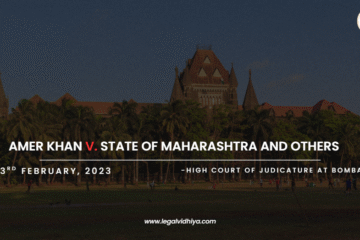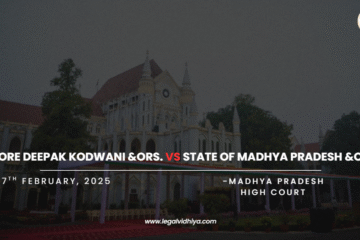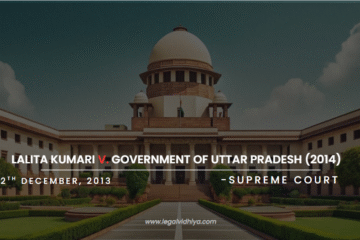
| CITATION | 1986 AIR 180, 1985 SCR SUPL. (2) 51, AIR 1986 SUPREME COURT 180, 1986 CRILR(SC&MP) 23, 1985 (3) SCC 545, (1985) 2 BOM CR 434 |
| DATE | 10 July, 1985 |
| Y.V. Chandrachud (CJ), Syed Murtaza Fazalali, V.D. Tulzapurkar, O. Chinnappa Reddy (J), A. Varadarajan (J) | Supreme Court of India |
| DEFENDANT/RESPONDENT | BOMBAY MUNICIPAL CORPORATION & ORS. ETC. |
| PLAINTIFF/APPELLANT/PETITIONER | OLGA TELLIS & ORS |
| JUDGES | Y.V. Chandrachud (CJ), Syed Murtaza Fazalali, V.D. Tulzapurkar, O. Chinnappa Reddy(J), A. Varadarajan (J) |
INTRODUCTION
The case of Olga Tellis & Ors v. Bombay Municipal Corporation (1985) is important in Indian constitutional law, as it set a precedent for enlarging the sphere of the right to life under Article 21 of the Constitution to allow for the right to livelihood. The mass eviction campaign arose from the actions of the State of Maharashtra and the Bombay Municipal Corporation, which sought to evict, via force, pavement dwellers and slum dwellers situated in Bombay under Section 314 of the Bombay Municipal Corporation Act, 1888. The affected persons, through the petitioners, challenged the eviction on the grounds that the demand for eviction would have grossly violated their fundamental rights, with emphasis on the right to life and the right to livelihood under Article 21, along with Article 19(1)(e) and Article 19(1)(g). The case required the Supreme Court to be involved in these questions of individual rights against governance and public interest, applying some procedural fairness and, at times, duty of care from the government to the disturbed subaltern communities.
FACTS
- Pavement and slum dwellers in Bombay were facing an eviction by the Bombay Municipal Corporation.
- State of Maharashtra and Bombay Municipal Corporation.
- The respondents resolved they would evict the pavement and slum-dwelling petitioners forcibly and send them to their places of origin or remove them out of Bombay.
- The petitioners challenged the respondents’ decision by asserting that eviction would mean depriving them of their means of livelihood, which would be in violation of Article 21 (right to life) of the Constitution. They claimed also that this violates Article 19(1)(e) (right to reside and settle) and 19(1)(g) (right to practice any profession).
- The petitioners attacked Section 314 of the Bombay Municipal Corporation Act of 1888 as being arbitrary and unreasonable, inasmuch as it permitted the removal of encroachments without notice.
- According to the respondents, there ought to be no question of the petitioners claiming any right of encroachment upon the public property and that this Section 314 of the Act was in the public interest. The respondents also contended the petitioners shall be estopped from claiming the right to livelihood, as they conceded in the High Court that the petitioners had no fundamental right.
- The Court held that petitions are maintainable in Article 32 of the Constitution, notwithstanding the petitioners conceding certain matters in the High Court.
- The Court held that the right to livelihood is an inseparable element of the right to life guaranteed by Article 21.
- The Court considered that Section 314 is an enabling provision and not a mandatory one, which means that it gives to the Commissioner a discretion, and the exercise of this discretion cannot be in complete disregard of the surrounding circumstances without issuing a notice.
MAIN ISSUES
- Is the forcible eviction of pavement and slum dwellers by the Bombay Municipal Corporation violative of their rights under Article 21 of the Constitution since the eviction deprives them of earning their livelihood?
JUDGEMENT
The Supreme Court stated that the writ petitions fall under Article 32 of the Constitution and that the right to life under Article 21 includes the right to livelihood. The court judged that eviction of pavement dwellers would be a deprivation of livelihood, amounting to a violation of their right to life. It stated that there can be no estoppel against the Constitution and that fundamental rights cannot be bargained away. The court made it clear that any procedure laid down by law for the deprivation of someone’s fundamental rights has to be fair, reasonable, and promulgated in justice. Moreover, the court gave its interpretation of Section 314 of the Bombay Municipal Corporations Act as being merely enabling and not obligatory, reasoning that the Commissioner would exercise discretion in a reasonable and fair manner, with respect to the ambient circumstances, prior to proceeding to remove encroachments without notice.
REASONING
- Right to Livelihood as Part of Right to Life (Article 21)
The court said that the right to life under Article 21 includes the explication of the right to livelihood. It was maintained that life becomes absolutely meaningless and impossible in the absence of means of living. The court argued that deprivation of livelihood means deprivation of life, and therefore it becomes necessary to include the right to livelihood within Article 21.
- No Estoppel Against Fundamental Rights
The court rejected the claim that the petitioners were estopped from asserting their fundamental rights because, in the High Court, they had conceded that they had no right to construct huts on pavements. It reasoned that fundamental rights existed not only for the benefit of individuals but also in larger community perspectives. Accordingly, no one could barter his fundamental rights, and any concession still made, or for that matter any proceedings in the past, could not mean his denial in a future assertion.
- Reasonableness of Procedure for Eviction
The court made it clear that any procedure established by law for depriving a person of his fundamental rights is fair, just, and reasonable. It also scrutinised the provisions of section 314 of the Bombay Municipal Corporation Act, which allowed for removing encroachments without a notice. The court had interpreted this section as an enabling provision, not mandatory, that the municipal commissioner decides whether to issue a notice for removing an encroachment after considering the circumstances.
- Obligation of the State
The court read into the Directive Principles of State Policy, particularly Article 39(a) and Article 41, which impose upon the state a duty to secure adequate means of livelihood and a right to work for its citizens. Thus, although the State cannot be compelled to provide these programmes in an affirmative manner, if deprivation of livelihood occurs, it should be, according to just and fair proceedings established by law, and such deprivation can be challenged under Article 21.
- Empirical Data and Common Sense
The court applied empirical data and some common sense to get at the realities that slum and pavement dwellers experience. It noted that these people usually fall into these conditions because they are in search of job opportunities that are inaccessible to them in their villages. The court noted that removal would effectively throw them out of their livelihood and, accordingly, out of their right to life.
CONCLUSION
The ruling of the Supreme Court in Olga Tellis & Ors v. Bombay Municipal Corporation solidified the view that the right to life is regarded under Article 21 as inseparable from the right to livelihood, as deprivation from the livelihood actually means deprivation from the means of living. The court held that no fundamental right could be given up or bargained away but that any action concerning such rights would need to be coupled with a procedure that was fair. Section 314 of the Bombay Municipal Corporation Act was read as an enabling provision which made required discretion and surrounding considerations before eviction, including the issuance of notice whenever suitable. Besides recognising the entire responsibility of the State toward public places, the pronouncement left behind a legacy of compassion toward the marginalised while ensuring that such urban development does not infringe upon any fundamental rights. This matter is a landmark in defending vulnerable classes against arbitrary actions of the state.
REFERENCES
https://indiankanoon.org/doc/709776
Written by Parth Srivastava, Kamla Nehru Vidhi Sansthan, an intern under Legal Vidhiya.
Disclaimer: The materials provided herein are intended solely for informational purposes. Accessing or using the site or materials does not establish an attorney-client relationship. The information presented on this site is not to be construed as legal or professional advice, and it should not be relied upon for such purposes or used as a substitute for advice from a licensed attorney in your state. Additionally, the viewpoint presented by the author is personal.
‘Social Media Head’ and ‘Case Analyst’ of Legal Vidhiya.




0 Comments